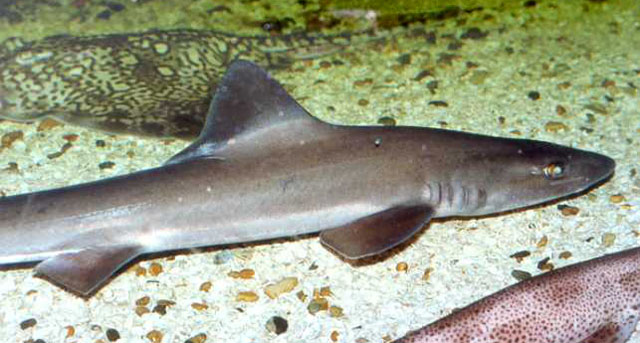| Triakidae (Houndsharks), subfamily: Triakinae |
| 200 cm TL (male/unsexed); max. reported age: 24 years |
|
demersal; marine; depth range 5 - 624 m |
| Eastern Atlantic: from the UK in the northeast Atlantic, south, including the Mediterranean Sea, Canary Islands, Morocco and south along the western African coast to eastern South Africa (Ref. 244, 127434). Often referred to as Mustelus canis which is restricted to the western Atlantic. |
|
Dorsal spines (total): 0-0; Dorsal soft rays (total): 0-0; Anal spines: 0-0; Anal soft rays: 0-0. A large, plain or black-spotted smoothhound (Ref. 5578). Uniformly grey or greyish-brown above, white below (Ref. 5578). |
| Found on the continental shelves and uppermost slopes, from the intertidal region to at least 350 m depth (Ref. 244). Collected to depth of 624 m in the eastern Ionian Sea (Ref. 56504). Sometimes in midwater but prefers to swim near the bottom (Ref. 244). Feeds mainly on crustaceans, but also cephalopods and bony fishes (Ref. 244). Viviparous, with a yolk-sac placenta (Ref. 244). Taken by shore and ski-boat anglers (Ref. 5578). Utilized for human consumption, oil, and fishmeal (Ref. 244). Sexual maturity is reached at a length of 70-80 cm (Ref. 35388). |
|
Endangered (EN); Date assessed: 04 August 2020 (A2bd) Ref. (130435)
|
| harmless |
Source and more info: www.fishbase.org. For personal, classroom, and other internal use only. Not for publication.
